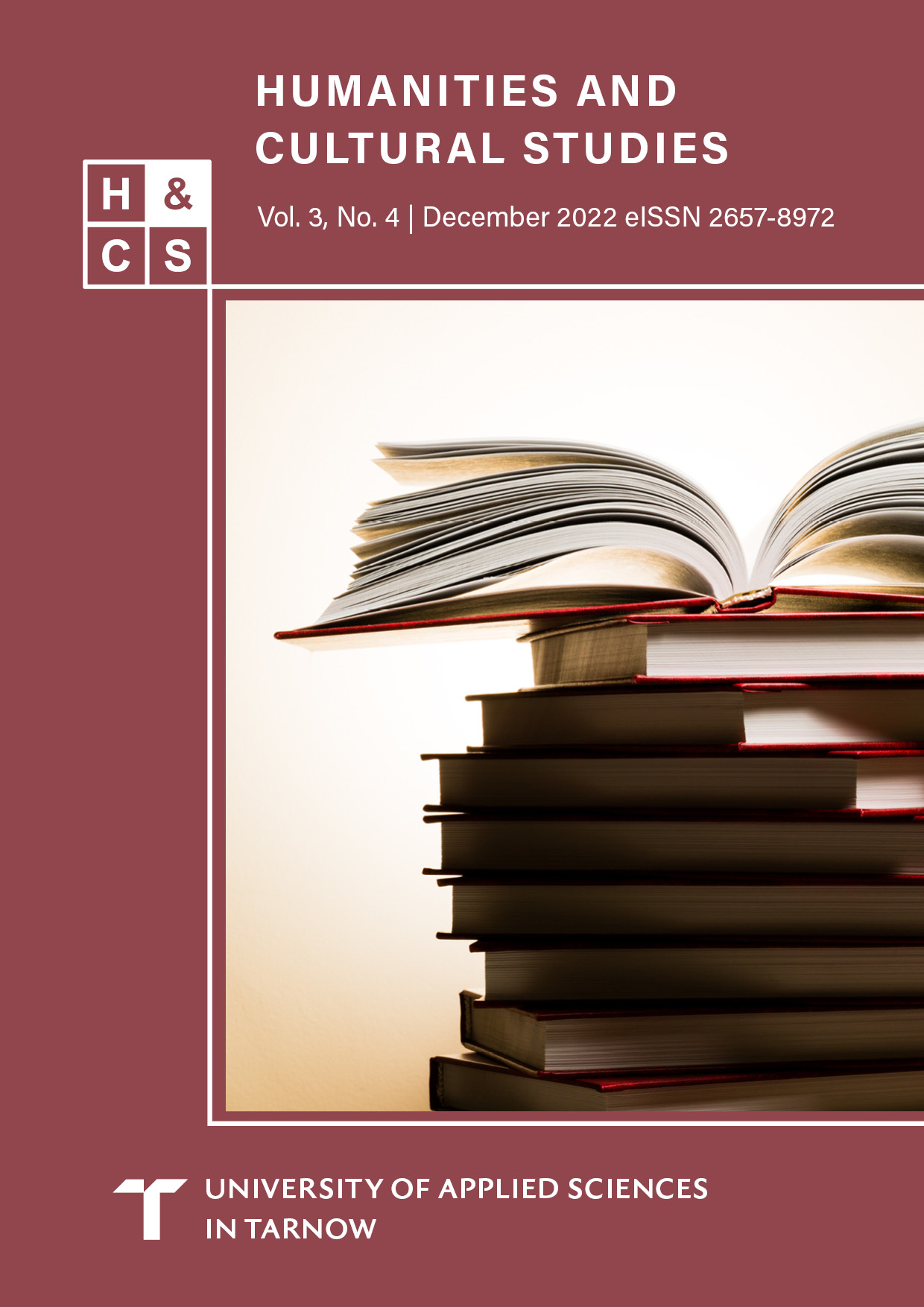The assumptions of intercomprehension in related languages and the development of student autonomy in language education
DOI:
https://doi.org/10.55225/hcs.468Keywords:
autonomy, intercomprehension, plurilingualismAbstract
Intercomprehension is a new approach to language acquisition and achieving plurilingualism. As a multifaceted phenomenon, it meets the expectations of foreign language users in multilingual communities of contemporary Europe. Intercomprehension results from the need of language users for greater autonomy in their linguistic contacts. The aim of the article is to show the assumptions of intercomprehension in terms of autonomy, to present EuroCom(Rom) method, to quote individual learner characteristics that enhance comprehension and are important for the development of an autonomous attitude, and finally to emphasise the teacher’s role.
Downloads
References
Autonomizacja w dydaktyce języków obcych. Doskonalenie się w komunikacji ustnej, red. W. Wilczyńska, Poznań 2002. Google Scholar
Balboni P.E., Esiste un’attitudine all’intercomunicazione?, [w:] Lernerautonomie durch Interkomprehension. Promoting Learner Autonomy Through Intercomprehension. L’autonomisation de l’apprenant par l’intercompréhension, red. P. Doyé, F.-J. Meissner, Tübingen 2010, s. 17–28. Google Scholar
Balboni P.E., Scheda di auto-osservazione dell’attitudine alle LS/L2, https://www.itals.it/materiali-didattici [dostęp: 16 listopada 2022 r.]. Google Scholar
Blanche-Benveniste C., Comment retrouver l’expérience des anciens voyageurs en terres de langues romanes?, [w:] S’entendre entre langues voisines: vers l’intercompréhension, red. V. Conti, F. Grin, Genève 2008, s. 33–51. Google Scholar
Boratyńska-Sumara J., Transfer międzyjęzykowy w tworzeniu wypowiedzi pisemnych w języku niemieckim (L3) u polskich studentów filologii angielskiej, Kraków 2021. DOI: https://doi.org/10.12797/9788381385282 Google Scholar
Castagne E., Systémiques, hiérarchisations et autonomisations: vers une dynamique évolutive et adaptive, [w:] Lernerautonomie durch Interkomprehension. Promoting Learner Autonomy Through Intercomprehension. L’autonomisation de l’apprenant par l’intercompréhension, red. P. Doyé, F.-J. Meissner, Tübingen 2010, s. 11–16. Google Scholar
Castagne E., InterCompréhension Européenne, http://logatome.eu/ice.htm [dostęp: 16 listopada 2022 r.]. Google Scholar
Coste, D., B. North, J. Sheils, J. Trim, (Rada Europy), Europejski systemem opisu kształcenia językowego: uczenie się, nauczanie, ocenianie, Warszawa 2003. Google Scholar
Cyr P., C. Germain, Les stratégies d’apprentissage, Paris 1998. Google Scholar
Degache C., Concevoir un dispositif de formation en ligne de formateurs à la compréhension et à l’interaction plurilingues, [w:] S’entendre entre langues voisines: vers l’intercompréhension, red. V. Conti, F. Grin, Genève 2008, s. 299–322. Google Scholar
Dictionnaire de didactique du français langue étrangère et seconde, red. J.-P. Cuq, Paris 2003. Google Scholar
Escudé P., P. Janin, Le point sur l’intercompréhension, clé du plurilinguisme, Paris 2010. Google Scholar
Galińska–Inácio I., A. Randak, H.G. Klein, T.D. Stegmann, EuroComRom — Siedem sit: Jak od razu czytać teksty w językach romańskich, Aachen 2004. Google Scholar
Gębal P.E., Interkomprehensja, strategie mediacyjne i nauczanie języków obcych, [w:] Tłumaczenie dydaktyczne w nowoczesnym kształceniu językowym, red. E. Lipińska, A. Seretny, Kraków 2016, s. 77–93. Google Scholar
Grabowska A., Interkomprehensja w językach pokrewnych – jej założenia i możliwości adaptacji w nauczaniu języków obcych w Polsce, [w:] Problemy współczesnej neofilologii. Wybrane zagadnienia, red. A. Grabowska, J. Graca, L. Smutek, Tarnów 2013, s. 281–291. Google Scholar
Grabowska A., Cechy użytkowników języków obcych sprzyjające interkomunikacji (komunikacji w językach pokrewnych), „Neofilolog” 2017, nr 48/1, s. 143–157. DOI: https://doi.org/10.14746/n.2017.48.1.09 Google Scholar
Grin F., Pourquoi l’intercompréhension ?, [w:] S’entendre entre langues voisines: vers l’intercompréhension, red. V. Conti, F. Grin, Genève 2008, s. 17–30. Google Scholar
Klein H.G., Où en sont les recherches sur l’eurocompréhension ?, [w:] EuroCom. Mehrsprachiges Europa durch Interkomprehension in Sprachfamilien. Tagungsband des Internationalen Fachkongresses in Hagen, 9.-10. November 2001, red. G. Kischel, Hagen 2002, s. 35–45. Google Scholar
Labbé G., Aborder les langues slaves par l’intercompréhension, „Miriadi” 2019, nr 1, http://publications.miriadi.net/index.php?id=75 [dostęp: 14 listopada 2022 r.]. Google Scholar
Lipińska E., Język ojczysty, język obcy, język drugi. Wstęp do badań dwujęzyczności, Kraków 2003. Google Scholar
Meissner F.-J., Le transfert dans la didactique du plurilinguisme, [w:] EuroCom. Mehrsprachiges Europa durch Interkomprehension in Sprachfamilien. Tagungsband des Internationalen Fachkongresses in Hagen, 9.–10. November 2001, red. G. Kischel, Hagen 2002, s. 46–58. Google Scholar
Robert J.P., Dictionnaire pratique de didactique du FLE, Paris 2002. Google Scholar
Tassinari M.G., Autonomia d’apprendimento: esperienze d’autovalutazione, [w:] Lernerautonomie durch Interkomprehension. Promoting Learner Autonomy Through Intercomprehension. L’autonomisation de l’apprenant par l’intercompréhension, red. P. Doyé, F.-J. Meissner, Tübingen 2010, s. 161–172. Google Scholar
Wilczyńska W., Uczyć się czy być nauczanym? O autonomii w przyswajaniu języka obcego, Warszawa 1999. Google Scholar
Downloads
Published
How to Cite
Issue
Section
License
Copyright (c) 2023 Anna Grabowska

This work is licensed under a Creative Commons Attribution-NonCommercial 4.0 International License.





